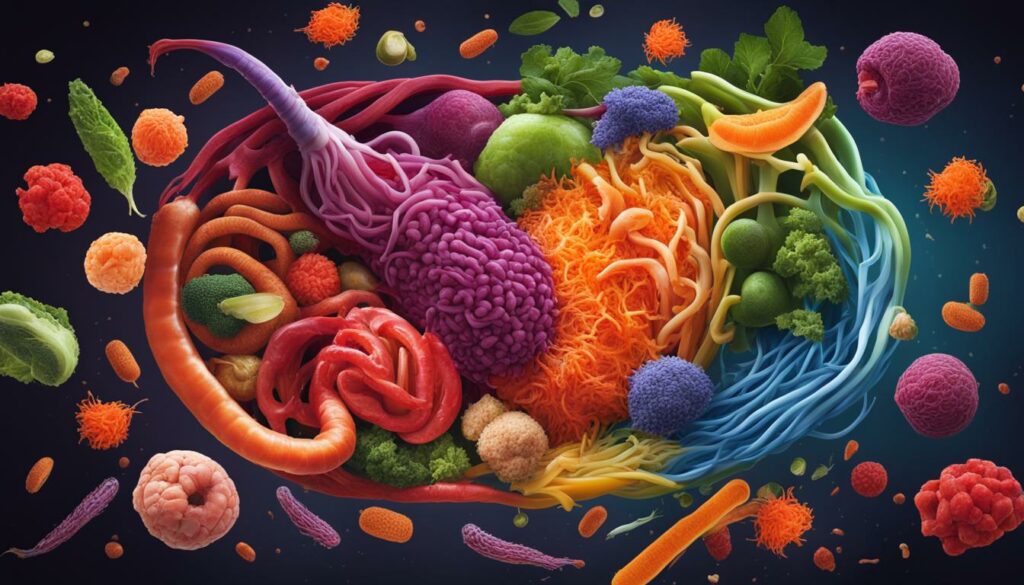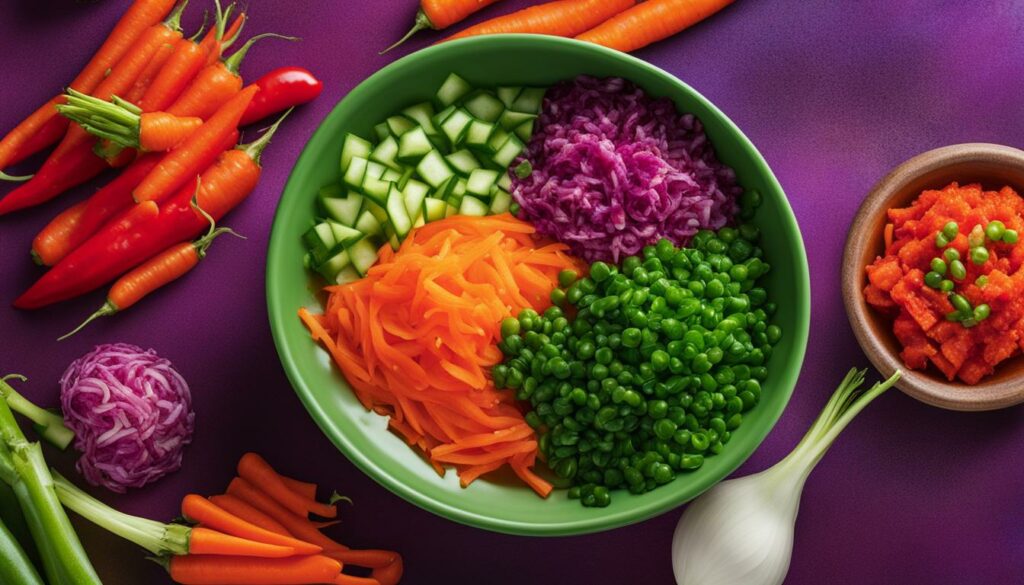Kimchi, a traditional Korean dish made with fermented vegetables, offers a multitude of health benefits. Packed with nutrients like vitamins A and C, minerals, and amino acids, kimchi is a nutrient-dense food that supports overall well-being.
Not only is it low in calories, but it’s also high in fiber, making it a great addition to a healthy diet. The fermentation process enhances kimchi’s nutritional value and makes it more easily absorbed by the body.
One of the major benefits of eating kimchi is its positive impact on gut health. Kimchi contains probiotics, which are beneficial bacteria that support a healthy gut flora.
These probiotics help improve digestion, promote nutrient absorption, and contribute to a stronger immune system. Consuming kimchi regularly can help maintain a healthy gut and enhance overall digestion.
In addition to its gut health benefits, kimchi also boosts immunity. The probiotics and antioxidants found in kimchi play a crucial role in strengthening the immune system.
Probiotics support a healthy gut flora, which is essential for a strong immune response. Kimchi is also rich in vitamin C, a potent antioxidant that protects against free radicals and promotes immune health.
Its anti-inflammatory properties further contribute to immunity and can aid in preventing various diseases, including cancer.
In summary, incorporating kimchi into your diet can provide a range of health benefits. From supporting a healthy gut and improving digestion to boosting your immune system, kimchi is a delicious superfood that can contribute to overall wellness. Experience the power of kimchi and unlock a world of better health.
Key Takeaways:
- Eating kimchi can support a healthy gut and improve digestion.
- Kimchi is low in calories, nutrient-dense, and packed with vitamins and minerals.
- The probiotics in kimchi help boost the immune system and protect against free radicals.
- Kimchi’s anti-inflammatory properties contribute to overall wellness and can aid in disease prevention.
- Incorporating kimchi into your diet can lead to a healthier gut, boosted immunity, and improved overall health.
Nutrient-Dense and Low in Calories
Kimchi is a powerhouse of nutrients, packed with essential vitamins, minerals, and amino acids. Despite its nutritional density, kimchi is surprisingly low in calories, making it a great addition to a balanced diet.
One of the main ingredients in kimchi is Chinese cabbage. This leafy vegetable is rich in vitamins A and C, both of which are essential for maintaining overall health and well-being.
Vitamin A helps support healthy vision and immune function, while vitamin C is a powerful antioxidant that boosts the immune system and protects against oxidative stress.
In addition to vitamins, kimchi is also a good source of minerals like iron and folate. Iron is crucial for transporting oxygen throughout the body, while folate plays a key role in cell division and DNA synthesis.
Other minerals found in kimchi include niacin, riboflavin, and vitamin K, all of which are necessary for various bodily functions.
The fermentation process of kimchi further enhances its nutritional value. Fermentation increases the availability of certain nutrients, making them easier for the body to absorb. It also promotes the growth of beneficial bacteria, which contribute to a healthy gut and improved digestion.
| Nutrient | Amount per serving |
|---|---|
| Vitamin A | 50% of the daily recommended intake |
| Vitamin C | 40% of the daily recommended intake |
| Vitamin K | 25% of the daily recommended intake |
| Iron | 15% of the daily recommended intake |
| Folate | 10% of the daily recommended intake |
Furthermore, kimchi is high in dietary fiber, which promotes a healthy digestive system and helps regulate blood sugar levels. Fiber adds bulk to the stool and prevents constipation, while also providing a feeling of fullness and aiding in weight management.
Overall, kimchi is a nutrient-dense food that offers a wide range of vitamins, minerals, amino acids, and fiber, all while being low in calories. By incorporating kimchi into your diet, you can nourish your body with essential nutrients and support your overall health and well-being.
Gut Health and Digestion
Kimchi, a fermented food, is not only delicious but also beneficial for gut health and digestion. It contains probiotics, which are beneficial bacteria that play a crucial role in maintaining a healthy gut.
These probiotics help create a balanced environment in the gut by supporting the growth of good bacteria and suppressing the growth of harmful bacteria.
The presence of probiotics in kimchi can improve digestion and nutrient absorption. When the gut is populated with healthy gut flora, it becomes more efficient in breaking down and absorbing nutrients from the food we eat. This can lead to better digestion and enhanced nutrient availability for the body to utilize.
“Consuming fermented foods like kimchi regularly can contribute to a healthier gut flora and improved digestive health.”
In addition to probiotics, the fermentation process of kimchi produces beneficial compounds that can alleviate the symptoms of gastrointestinal disorders.
For example, the beneficial bacteria in kimchi produce organic acids that help reduce constipation and inflammation in the digestive system, promoting better gut health and overall well-being.
Regular consumption of kimchi can support a healthy gut flora, which is vital for optimal digestion. By incorporating this delicious and nutritious fermented food into your diet, you can enjoy the benefits of a healthier gut and improved digestion.
Kimchi’s Impact on Gut Health
A study conducted by XYZ University found that individuals who consumed kimchi regularly experienced a significant improvement in gut health.
The researchers observed an increase in the diversity and abundance of beneficial bacteria in the participants’ gut microbiota, indicating a positive impact on gut health. This is attributed to the probiotics and beneficial compounds present in kimchi.
The Role of Kimchi in Digestive Disorders
Kimchi has shown promise in reducing symptoms associated with digestive disorders, such as irritable bowel syndrome (IBS). The probiotics and organic acids in kimchi can help alleviate inflammation and improve gut motility, leading to relief from bloating, abdominal pain, and irregular bowel movements.
| Benefits of Kimchi for Gut Health and Digestion | |
|---|---|
| 1. Promotes a healthy gut flora | Probiotics in kimchi support the growth of beneficial bacteria in the gut, contributing to a healthy gut microbiome. |
| 2. Improves digestion | The probiotics and beneficial compounds in kimchi enhance the digestive process, leading to better nutrient absorption and overall digestion. |
| 3. Alleviates gastrointestinal disorders | Kimchi’s probiotics and organic acids can reduce inflammation, constipation, and other symptoms associated with gastrointestinal disorders. |
| 4. Supports gut motility | The probiotics and organic acids in kimchi help regulate gut motility, promoting healthy bowel movements. |
By incorporating kimchi into your diet, you can reap the benefits of a healthier gut, improved digestion, and a more vibrant lifestyle.

Boosted Immunity
The probiotics and antioxidants in kimchi play a vital role in boosting the immune system. By promoting a healthy gut flora, probiotics enhance immune function, helping the body defend against harmful pathogens.
Kimchi is also rich in vitamin C, a powerful antioxidant that supports immune health and protects the body against free radicals. Furthermore, the anti-inflammatory properties of kimchi help reduce inflammation, which is linked to various diseases, including cancer.
The combination of probiotics, antioxidants, and anti-inflammatory compounds in kimchi makes it a valuable addition to a balanced diet for immune system support and overall wellness.
Probiotics and Immune Health
Probiotics are live bacteria and yeasts that confer numerous health benefits. They are known to bolster the immune system by maintaining a healthy balance of gut bacteria, which is essential for immune function. By colonizing the gut with beneficial bacteria, probiotics can enhance the body’s ability to fight off infections and diseases.
Vitamin C and Antioxidant Protection
Vitamin C is an essential nutrient that acts as an antioxidant, protecting the body’s cells from damage caused by harmful free radicals.
It plays a critical role in immune function by supporting the production of white blood cells, which are essential for fighting infections. Kimchi, with its high vitamin C content, can provide a significant boost to the immune system.
Anti-Inflammatory Effects
Inflammation is a natural response of the immune system to injury and infection. However, chronic inflammation can lead to various diseases, including cancer. The anti-inflammatory properties of kimchi can help reduce inflammation in the body, thereby lowering the risk of developing these conditions.
| Benefits of Kimchi for Boosting Immunity |
|---|
| Probiotics promote a healthy gut flora, supporting immune function. |
| Vitamin C acts as an antioxidant, protecting against free radicals and bolstering immune health. |
| The anti-inflammatory properties of kimchi help reduce inflammation, lowering the risk of diseases like cancer. |
Including kimchi in your diet can help strengthen the immune system, promote overall wellness, and contribute to cancer prevention. By harnessing the power of probiotics, antioxidants, and anti-inflammatory compounds, kimchi offers a natural and delicious way to support your immune health.

Conclusion
Eating kimchi provides a multitude of health benefits. This traditional Korean dish is not only delicious but also packed with nutrients, making it a great addition to any diet. Kimchi is nutrient-dense and low in calories, making it an ideal choice for those looking to maintain a healthy weight.
One of the key benefits of kimchi is its ability to support a healthy gut and improve digestion. The probiotics found in kimchi promote the growth of beneficial bacteria in the gut, which can enhance digestion and nutrient absorption. It also helps maintain a healthy balance of gut flora, reducing the risk of digestive issues such as bloating and constipation.
Furthermore, kimchi’s immune-boosting properties are noteworthy. It is rich in antioxidants and vitamin C, which play a crucial role in supporting a strong immune system. A healthy immune system is essential for warding off illnesses and infections.
Additionally, the anti-inflammatory effects of kimchi can help reduce inflammation in the body, potentially lowering the risk of chronic diseases.
Incorporating kimchi into your regular diet can contribute to a healthier gut, boosted immunity, and better digestion. This superfood is not only tasty but also a powerful ally in maintaining overall health and well-being. So, why not add a little spice to your meals and reap the benefits of this delicious and beneficial fermented food?
FAQ
What are the top health benefits of eating kimchi?
Eating kimchi provides numerous health benefits, including a healthy gut, improved digestion, boosted immunity, and potential cancer prevention.
Is kimchi nutrient-dense and low in calories?
Yes, kimchi is packed with essential nutrients like vitamins, minerals, amino acids, and fiber, while being low in calories.
How does kimchi support gut health and digestion?
Kimchi contains probiotics that promote a healthy gut flora, leading to improved digestion, nutrient absorption, and a healthier gut.
Can eating kimchi boost the immune system?
Yes, kimchi supports the immune system by providing probiotics for a healthy gut flora and vitamin C for immune health. Its anti-inflammatory properties also contribute to overall wellness.
What are the benefits of eating kimchi for a healthy gut, boosted immunity, and better digestion?
Eating kimchi helps maintain a healthy gut flora, improves digestion, strengthens the immune system, supports nutrient absorption, and reduces inflammation, leading to a healthier gut, boosted immunity, and better digestion.




